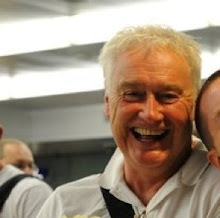
There’s a whiff of mothballs at Richmond, and it’s not all coming from the audience in this starry but stolid revival of Noel Coward’s Blithe Spirit …
A glossy 2009 Broadway production showcased Angela Lansbury in cracking and crackpot form as clairvoyant Madam Arcati and Rupert Everett in a role he was born to play, the suave and languid author Charles Condomine.
At Richmond on the last leg of its 'immediately prior to West End' tour, a new British production heads for the Apollo in Shaftesbury Avenue next week and features Alison Steadman as the medium, Robert Bathurst and Hermione Norris reprising their Cold Feet pairing as the novelist and his wife, and Ruthie Henshall as the ghostly ex accidentally manifested during a séance.
From the same Triumph/Theatre Royal Bath production stable as the Kim Cattrall Private Lives and helmed by Thea Sharrock who directed the brilliant Daniel Radcliffe Equus, it has all the ingredients of a surefire hit, and yet it doesn’t quite come off.
Even the indulgent Richmond audience wasn’t lapping it up, although they seemed to appreciate the physical comedy better than the dialogue which is only partially explained by the ruckus at the desk in the foyer when several complained their hearing-impaired headsets weren’t working.
It’s smartly costumed with authentic late 1930s gowns, but both script and setting feel stale: a childless and fustian middle class marriage afloat on a wash of cocktails and coffee fetched by servants is all about to be swept away by the war, and whilst there’s no spectre of the coming realities in Coward’s script, this production doesn’t sustain a constant barrage of bright and brittle banter either.
Coward wrote (and Margaret Rutherford made flesh) Madame Arcati as a tweedy countrywoman with an almost professorial interest in the occult – Steadman makes her much more strident which might be effective if it weren’t all on one note, and misses both the charming battiness and the sensitive vulnerability of the character. Perhaps she’s spent too long in easy sitcoms like Gavin and Stacey and Fat Friends but this isn’t her best work and doesn’t compare with the excellence of her last West End outing in Alan Bennett’s Enjoy.
Where Lansbury was balletic and hummed to herself as she danced about the stage, Steadman grunts and feints hand jives that look as though she’s pioneering hip-hop fifty years ahead of its time.
Norris is the most successful in the thankless role of Ruth, the domestically-rooted second wife, but she plays it with less petulance and more elegant authority than the part usually receives and so is more fairly matched with the impishness of Ruthie Henshall’s shoeless and footloose Elvira.
The set, by the usually laudable Hildegard Bechtler has predictable art deco touches but looks cheap with a tackily painted piano and centerpiece terrible green sofa with rigid polyurethane foam cushions which weren’t around till the 50’s.
This review written for Londonist




